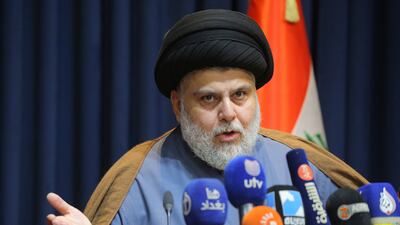Iraq’s election results have drawn a mixed response from political parties, casting doubt on their ability to reach an agreement to form the new government.
After weeks of dealing with about 1,500 complaints and recounting some of the ballots, Iraq’s Independent High Elections Commission confirmed the final results of October's poll on Tuesday.
The political bloc sponsored by prominent Shiite cleric Moqtada Al Sadr won 73 seats in the 329-seat parliament, followed by Taqadum party, led by Sunni Parliament Speaker Mohammed Al Halbousi, with 37 seats, and former prime minister Nouri Al Maliki’s State of Law bloc was third with 33 seats.
Al Fatah bloc, made up mainly of pro-Iran Shiite militias, lost out, with only 17 seats, compared to the 45 seats it won in 2018.
The recounts of contested ballot boxes have only affected five seats, in five provinces – Baghdad, Nineveh, Erbil, Basra and Kirkuk.
Al Fatah and the Kurdistan Alliance got two new seats each, while Sunni Azim coalition, led by tycoon Khamis Al Khanjar got one seat.
Shortly after announcing the results, Mr Al Sadr launched the hashtag #ThankYouElectionCommisson on Twitter, which trended mainly among his followers.
Despite emerging as the clear winner, Mr Al Sadr faces a rough road ahead to form a functioning government.
The Shiite Co-ordination Framework, made up of Al Fatah, State of Law and other parties renewed their rejection of the results, accusing the IHEC of manipulation, despite the EU and UN saying the poll was well-managed.
“We categorically reject the current election results,” the group said. “It is clear now and without any doubt that the Elections Commission had prepared these results before against the will of the Iraqi people,” it added.
Their demands are now beyond recounting the votes.
“We reiterate our firm stance, which is based on documents and proof that there has been widespread manipulation in the elections results,” it said.
“We are committed to continue our lawsuit, which we have filed at the Federal Court to annul the elections,” the group added.
How will the new Iraqi government be formed?
The results have been sent to the Supreme Federal Court for ratification.
Once they are approved, Iraqi President Barham Salih will call on the new parliament to convene. The largest political bloc will be declared in the first session to have the right to nominate a prime minister and start negotiations to form the government.
It is still unclear whether the Co-ordination Framework, which has more than 50 seats, can form an alliance inside the parliament or ally with other parties given the differences among its leaders.
Since no party won a majority of seats in parliament, negotiations to choose a prime minister and form the new government are expected to take weeks or even months.
The new parliament will have a set of newcomers. More independent candidates have won seats, including the prominent activist party, Imtidad Movement with nine seats.
For Riyadh Ashour, a resident of the southern city of Nasiriyah, the elections have failed to ease the grip of the political parties.
“The same political parties are still controlling the country,” Mr Ashour, 59, told The National. “They play it in a way that allows them to stay in power and maintain full control,” he added.
But the presence of independent candidates brings some hope.
“Although they can’t do anything significant now, their presence is a seed that we will water and support to bring change in the future,” he said.









